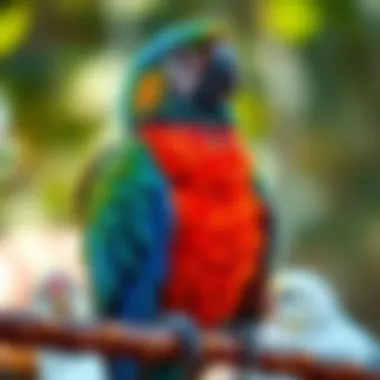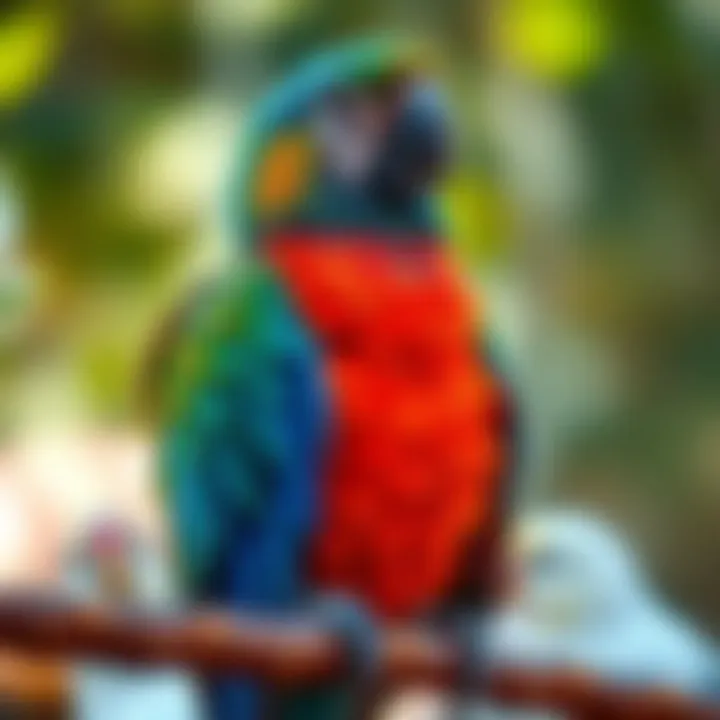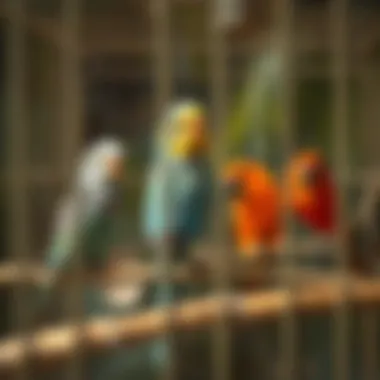Comprehensive Guide to Nationwide Bird Insurance


Intro
Navigating the world of pet ownership can be likened to walking through a dense forest. Among the many paths one can take, choosing the right type of insurance for one’s avian companion is crucial. Birds, with their vibrant colors and enchanting songs, are beloved by many. However, owning a bird comes with its own set of challenges, from finding the right habitat to ensuring their health. Just as one would prepare for a journey, understanding the essentials of nationwide bird insurance can provide peace of mind and promote responsible ownership.
In recent years, the culture around pet insurance has evolved significantly. Bird insurance has emerged as a necessary option for many owners, offering a safety net that safeguards both the financial and emotional investment one makes in their pet. This insurance serves not just as a policy for unexpected mishaps, but as a broader commitment to bird welfare.
By diving into the specifics of bird insurance, we will uncover its importance, range of coverage options, and the leading providers in the market. This article aims to illuminate the role of bird insurance in fostering a responsible and caring approach to pet ownership while also considering the implications for bird welfare. As we explore various topics, let’s create a clearer path through this densely packed knowledge forest.
Preface to Nationwide Bird Insurance
Understanding bird insurance is vital for any devotee of avian companions. Bird ownership brings not only joy and companionship but also a slew of responsibilities and potential risks. Whether it's a pesky parakeet or a regal macaw, our feathered friends require attentive care. In the event of an unexpected health issue or an accident, the financial implications can be daunting. Nationwide bird insurance steps in as a valuable safety net, making it an essential consideration for conscientious bird owners.
Understanding Bird Insurance
Bird insurance serves as coverage that helps manage the financial burden of veterinary expenses tied to medical care, accidents, or even loss. Unlike traditional pet insurance, bird insurance is often tailored to meet the unique needs of our feathered friends. It covers various aspects, including emergency treatments, surgical procedures, and possibly even routine check-ups. With many insurance plans tailored specifically for birds, it ensures that owners can make decisions based on health needs rather than financial constraints.
Interestingly, not all bird owners fully appreciate the breadth of coverage available under these policies. While some might assume the main focus is medical treatment, there are also protections against loss and theft, which can be significant, especially for more exotic species that carry a higher price tag.
Why Consider Insurance for Birds?
When pondering whether to get bird insurance, several compelling reasons come to light:
- Financial Relief: Veterinary costs can soar as quickly as our birds can fly. Insuring your bird can save you from sudden, prohibitive expenses when an emergency strikes.
- Peace of Mind: Knowing that you have a financial backup allows you to focus on your pet’s well-being during distressing times.
- Encouraging Preventative Care: Regular vet visits can help catch potential health issues before they escalate. Insurance often incentivizes preventative care, ultimately leading to a healthier bird.
- Comprehensive Protection: From coverage on routine wellness exams to emergencies, insurance can offer a complete safety blanket that lets pet owners feel more secure about their bird's health.
In short, bird insurance isn't simply about overcoming obstacles; it's about embracing responsible pet ownership. It reflects an owner’s commitment to ensuring the utmost well-being for their avian companions.
Types of Bird Insurance Coverage
Understanding the types of coverage available for bird insurance is crucial for any pet owner looking to ensure the well-being of their feathered friends. While birds can be delightful companions, they also come with their own set of unique health risks, making tailored insurance policies vital. Coverage types are not just about protecting against big-ticket expenses; they often encompass various aspects of care, comfort, and peace of mind for bird owners.
Medical Coverage for Birds
Medical coverage is often the cornerstone of any bird insurance policy. Just like humans, birds can suffer from illnesses or chronic conditions requiring veterinary attention and specialized treatments.
- Surgery and Hospitalization: If your bird needs a surgical procedure, say an egg binding surgery, or a more routine hospitalization due to illness, this coverage could save you from hefty vet bills.
- Medications and Treatments: Occasionally, birds need medications such as antibiotics or anti-inflammatory drugs. Medical coverage usually caters to these expenses, ensuring that treatment can be administered without concern for finances.
- Preventive Care: Some policies also extend their embrace to routine check-ups or vaccinations, which are integral for maintaining your bird's health over the years.
Having medical coverage can make a world of difference when an unexpected illness surfaces, as it allows for timely intervention, which can be the difference between life and death.
Accident and Injury Protection
Accidents happen, sometimes just in the blink of an eye. Birds are notoriously curious creatures, often getting themselves into tricky situations that can lead to injury. Accident and injury protection can cover a range of incidents, such as:
- Fractures and Broken Bones: If your bird takes a tumble or encounters a dangerous object, treatment for broken bones can be swift and expensive, making this coverage essential.
- Inadvertent Poisoning: Birds are vulnerable to toxins that humans might not think much about, such as houseplants or common household cleaners. Insurance can alleviate worries should an unintentional poisoning occur, ensuring immediate treatment is accessible.
- Trauma: Whether from a fall or an encounter with a household pet, birds can sustain severe injuries. This protection allows owners to seek immediate help without being paralyzed by financial constraints.
The Importance of Wellness Plans


Wellness plans have emerged as a beneficial option for bird insurance. These programs encourage preventative care and allow bird owners to keep a close eye on their pet’s overall health. They often cover visits to the vet, annual exams, and routine screening tests.
- Routine Check-ups: Regular vet visits can help identify potential issues before they become critical. With a wellness plan, these visits are more financially manageable.
- Diet and Nutrition: Some plans also include consultations aimed at ensuring your bird receives the necessary dietary attention, which can vastly improve their quality of life.
- Behavioral Consultations: If your bird exhibits troubling behaviors, wellness plans may help cover behavioral specialists who can provide insights and effective strategies.
Coverage Limits and Exclusions
Understanding coverage limits and exclusions is like reading the fine print on a contract - it’s vital and can save you a lot of heartache later down the line. Not all insurance policies are created equal, and digging into the coverage details can help you select the best option. Key points include:
- Annual Limits: Many policies have a cap on the amount they will pay each year, which can dictate how extensive your bird's coverage is.
- Pre-existing Conditions: Most providers won't cover any conditions that existed before the policy took effect, so it’s wise to be transparent during the application process.
- Specific Breeds: Some policies could also have limitations based on the type of bird you own, especially concerning exotic species. Ensure you read the specific terms for your pet.
"Knowing the ins and outs of your bird insurance policy might not be glamorous, but it's crucial for ensuring your avian friend gets the treatment they deserve."
Choosing the Right Policy
Selecting the right insurance policy for your bird is not just about ticking a box; it's about ensuring peace of mind and safeguarding your feathery friend. Birds, much like other pets, have unique health needs and specific risks associated with their living conditions. It's crucial to make informed choices when considering their insurance coverage to guarantee you’re adequately prepared for unexpected situations.
Evaluating Insurance Providers
With a plethora of options available, choosing an insurance provider requires some digging. Start by looking for companies that specifically cater to avian care. Not all pet insurance providers extend their services to birds, so ensure you’re dealing with those who understand the nuances of avian health.
When evaluating potential insurers, consider:
- Customer feedback: Online reviews and testimonials can provide insight into how a company responds to claims.
- Reputation: Research the company’s history with bird insurance; longevity often correlates with reliability.
- Coverage breadth: Assess the extent of coverage offered—does it include conditions specific to your bird species?
Understanding Policy Terms
Policy jargon can sometimes feel like deciphering a foreign language. Familiarize yourself with the key terms such as premiums, deductibles, and co-pays. Many hopeful bird owners stumble at the fine print, missing essential details that can affect future claims.
Key terms to grasp include:
- Exclusions: Understand what is not covered. This could include pre-existing conditions, certain accidents, or specialized treatments.
- Waiting periods: Know how long you must wait before coverage kicks in after enrolling.
With thorough understanding of these terms, you will avoid unwelcome surprises down the line.
Assessing Your Bird's Needs
Each bird is unique, and its insurance should reflect its specific needs. Factors to consider include:
- Species and Breed: Different birds have varied health risks; for example, larger parrots might require different coverage than canaries.
- Age and Health Status: Older or pre-existing health conditions might necessitate more comprehensive coverage.
- Lifestyle: Indoor vs. outdoor living can also influence risk.
Taking these variables into account can guide you to a policy that truly aligns with your bird's lifestyle and health profile.
Costs Involved in Bird Insurance
Understanding the financial implications of bird insurance is vital. Premiums can vary greatly depending on the provider, the type of coverage, and your bird's unique characteristics. Typically, a policy will fall into a range, influenced by:
- Age of the Bird: Older birds tend to have higher premiums.
- Coverage Level: Comprehensive plans usually come with a heftier price tag compared to basic ones.
- Geographic Location: Rates may change based on where you live. Cities may have higher provider costs.


It’s wise to request quotes from multiple providers to ensure you’re getting a fair price. Evaluating how these costs impact your budget can be just as important as the coverage itself.
"Insurance can’t prevent bad things from happening, but it can cushion the blow when they do."
Claim Process for Bird Insurance
Understanding the claim process for bird insurance is crucial for any pet owner. A seamless claim experience can greatly lessen the financial burden during stressful times. When unexpected health problems or accidents arise, having a clear pathway to file a claim will ensure that your feathered companion receives timely care while easing your mind about costs.
How to File a Claim
Filing a claim with your bird insurance provider should be a straightforward process. Usually, you will start by contacting the insurance company specific to your policy. This can often be done through their website or customer service line. Here's a step-by-step guide to help you navigate this process:
- Contact Your Insurance Provider: Reach out either via phone or online portal.
- Prepare Relevant Information: Gather details about your bird's condition, any veterinary visits, and treatments given.
- Complete the Claims Form: Fill out the necessary forms, which might involve detailing the circumstances of the incident and treatment received.
- Submit the Claim: Send your completed claim, along with any required documents, to your insurance company.
This may seem like a lot to go through, but many companies provide user-friendly platforms to ease the process.
Documentation Requirements
Providing the right documentation is key to successful claims processing. Each insurance provider will have its own list of requirements, but in general, you might need to supply the following:
- Veterinarian Report: A detailed account from your vet outlining the diagnosis and justification for treatment.
- Receipt for Services Rendered: Proof of payment for treatment, which aids in determining the claim amount.
- Claim Form: Most insurance companies will require a specific form to be filled out.
Getting everything in order from the start can save you time and headaches down the road. Often, policyholders find that issues arise from missing paperwork or incomplete forms.
Common Issues with Claims
While the claim process aims to support bird owners, several recurring issues can arise that might complicate matters:
- Incomplete Information: Submitting less than a complete or accurate set of documents can delay the claim or lead to its denial.
- Pre-existing Conditions: Many insurance providers have strict policies regarding pre-existing conditions. It’s essential to understand your policy’s stance on this beforehand.
- Miscommunication: Sometimes, the language in the insurance policy can lead to confusion. Clarifying any terms and limits with your provider ahead of time can avoid hurdles.
"Navigating the claim process smoothly can significantly enhance your experience with bird insurance, making it a valuable resource for unforeseen veterinary expenses."
By being thorough and understanding the necessary steps, you set yourself up for success. Remember, understanding the process not only gives you peace of mind but helps ensure your bird receives the prompts care they need when life takes an unexpected turn.
The Ethical Considerations of Bird Insurance
The subject of bird insurance stretches beyond mere financial safety nets. It taps into various ethical considerations surrounding the care and well-being of our avian companions. Taking out insurance can be seen as a commitment to the responsibility of pet ownership, reflecting a promise to provide proper care in the event of an unexpected mishap. These considerations are as critical as the policies themselves, helping an owner gauge the real value of insuring their feathered friends.
Impact on Bird Welfare
When discussing bird insurance, one cannot ignore its profound impact on bird welfare. First and foremost, having insurance ensures that a pet owner is prepared for the unpredictable nature of life. Birds, by their very nature, can be delicate creatures. They aren't as hardy as, say, a cat or a dog. A sudden illness or an accident could quickly escalate into a dire situation if the owner is not financially equipped to manage it.
Research shows that insured birds have better outcomes when medical emergencies arise. Insurance can cover important medical treatments that an owner may hesitate to pursue if funds are tight. This coverage encourages rapid response to health issues, fostering a culture where bird owners prioritize their pet's well-being.
Furthermore, the coverage extends to preventive care, such as annual check-ups or vaccinations. Thus, insurance doesn't just help when things go awry; it can actually promote proactive care, leading to healthier and happier birds. Ensuring the welfare of these creatures speaks to a larger issue of compassion and responsibility in caring for living beings.
Promoting Responsible Ownership


The relationship between bird insurance and responsible ownership cannot be understated. Insurance isn’t just a policy; it’s a reflection of an owner’s resolve to take their responsibilities seriously. Here’s where that sense of responsibility shines:
- Informed Choices: When an owner opts for insurance, they must first educate themselves on the various types of policies and what each covers. This research leads to informed decisions that ultimately benefit their birds.
- Long-term Commitment: The decision to insure birds shows a long-term commitment to their care. It challenges the myth that pets are disposable or easily replaceable.
- Financial Planning: It also pushes owners to think about their finances in a way that directly affects their pets' welfare. Budgeting for monthly premiums encourages a mindset of care and preparation.
In essence, bird insurance serves not only as a safety blanket for potential vulnerabilities but also as a platform for instilling a sense of duty in pet ownership. Owners learn that with the right measures, they can provide a higher quality of life for their birds.
"Investing in bird insurance is not just a financial choice; it’s a vote for ethical responsibility and commitment to the cherished lives of our pets."
Thus, navigating the ethical landscape of bird insurance fosters a community where birds are viewed as valued companions deserving of care, attention, and, crucially, protection.
Future Trends in Bird Insurance
As the landscape of pet ownership evolves, especially with the increasing popularity of birds as companion animals, bird insurance is also adapting to meet changing needs. Understanding the future trends in bird insurance is crucial for both potential and current bird owners. Not only does it provide insights into better coverage options, but it also highlights how the insurance sector is reacting to new customer demands and technological advancements.
Innovations in Policy Coverage
Policy coverage for bird insurance is becoming far more sophisticated. One notable trend is the addition of wellness plans that go beyond just accidents and emergencies. This allows bird owners to focus on preventative care, including regular vet visits, vaccinations, and nutrition consultations.
- Customizable Coverage: Insurance providers are offering more tailored options, letting customers select specific coverages that align with their bird's needs. For example, owners of exotic birds might want specialized coverage for particular ailments or species-specific health issues.
- Inclusion of Alternative Therapies: Another innovation is the inclusion of alternative treatments such as acupuncture or herbal remedies. Many pet owners advocate for holistic approaches to animal care, and insurance that covers these is becoming a selling point.
- Bundled Insurance Options: Some insurers are even testing bundled options where bird insurance can be paired with other types of pet insurance at a discount. This can be beneficial for households with multiple pets.
These innovations not only cater to the unique demands of bird owners but also encourage responsible pet care by making preventive measures more accessible.
The Role of Technology in Claims Processing
Technology is rapidly changing how bird insurance claims are processed. The emphasis on efficiency and user experience means that filing claims is smarter and faster.
- Mobile Apps: Many insurance companies are now rolling out user-friendly apps allowing pet owners to manage their policies seamlessly. From filing claims to accessing policy details, the process has never been easier.
- Telehealth Services: With the rise of telehealth, some insurance providers are starting to cover virtual vet consultations. This development is vital for quick assessments, especially when a visit to the vet may not be immediately feasible. It saves time, reduces stress for both owner and bird, and gets access to care out without delay.
- AI in Claims Management: Artificial intelligence is becoming integral to the claims process. By automating parts of the review process, AI can streamline how claims are evaluated, making it quicker to get approvals. In situations where a claim might have been stalled due to paperwork errors, the use of technology could minimize these hassles.
"The adaptability of bird insurance reflects broader trends in the pet insurance industry, signaling a more holistic approach to animal care."
Overall, the trajectory of bird insurance is aligned with advances that prioritize the health, welfare, and care convenience of beloved avian companions. Awareness of these future trends enables bird owners to make informed decisions, ensuring they are well-prepared both for today and for what tomorrow brings.
Closure
Bird insurance is not just a safety net; it represents a commitment to the well-being of our feathered companions. Understanding the nuances of bird insurance becomes vital as it offers numerous benefits that extend beyond mere financial security. In this conclusion, we shall dive into the key reasons why this coverage matters so much for bird owners.
The Significance of Bird Insurance
Birds, while often perceived as low-maintenance pets, can face a multitude of unforeseen health issues and accidents. Bird insurance serves as a crucial buffer, not only facilitating access to medical care but also offering peace of mind to owners. A policy provides critical coverage for various aspects such as:
- Routine health check-ups: Regular vet visits contribute to the overall health of birds, and having insurance alleviates the financial burden of these visits.
- Emergency medical treatment: Accidents or sudden illnesses can strike without warning. Having insurance ensures that timely care can happen without the worry of high costs.
- Preventative care: Many policies include wellness plans, covering vaccinations and regular screenings, which can be significantly beneficial in the long run.
In essence, bird insurance translates to prioritizing avian health, making sure our pets live longer and happier lives.
Final Thoughts on Owning Insured Birds
The acquisition of bird insurance should be regarded not merely as optional but as a responsible practice among pet owners. It reflects a proactive approach to ownership and care. When one understands the intricacies of policies available, it becomes evident that the advantages far outweigh the costs.
One must also consider the ethical implications of such coverage. By opting for insurance, bird owners commit themselves to ensuring adequate medical treatment at any given time, which promotes better welfare standards across the board.
Moreover, it encourages responsible ownership. Knowing that funds are readily available in case of health issues or accidents means pet owners are less likely to delay necessary treatment due to financial constraints. The notion of investing in bird insurance implies a promise to provide for these pets’ needs, which is a hallmark of diligent and compassionate pet ownership.
In summary, the world of bird insurance presents a myriad of benefits. It's about fostering a culture of responsibility among bird enthusiasts and ensuring that our cherished companions lead fulfilled, healthy lives.







